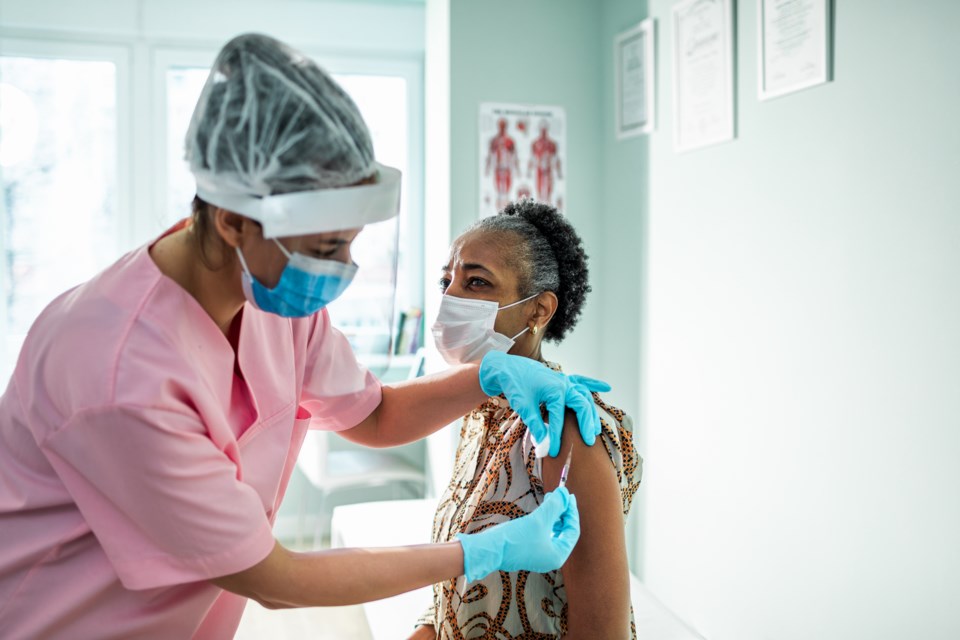It's hard to imagine in the midst of summer, but soon Canadians will be all bundled up and gathering inside once again to outlast the dreary winter months.
This emphasis on being indoors is why the National Advisory Committee on Immunization (NACI) has on a fall COVID-19 vaccine booster program and is urging Canadians to mark "get booster" in their calendars.
While Canadians consider NACI's latest recommendations, Samantha Yammine, science communicator and ScienceUpFirst executive advisory committee member, spoke to Glacier Media to debunk four of the most common myths surrounding COVID-19 booster shots.
Myth #1: Boosters mean vaccines don't work
Since Canadians are getting COVID-19 vaccines more frequently than other vaccines, Yammine said there's a misconception that the frequency of recommended doses means that each vaccine is not as effective.
This is not true, she said.
"We're not getting boosters because vaccines don't work," Yammine said.
Many other vaccines require boosters, but Canadians haven't been getting those as often because COVID-19 is spreading faster than other diseases.
"When the risk is higher, we change how we deal with prevention," she said.
Myth #2: All immunity fades
While some layers of immunity do eventually wane after immunization, Yammine said it's important to distinguish between the different levels of protection a vaccine provides.
As time passes, protection from early symptoms of COVID-19 can fade a little bit, Yammine said. But protection against being hospitalized or developing severe symptoms is still very strong, she explained.
"To curb the spread of [COVID-19], it's helpful to get a booster to enhance that layer of protection against that symptomatic infection," she said.
Yammine explained that the COVID-19 antibodies in a vaccinated person's blood circulate most effectively just after immunization. Eventually, she said they stop circulating as widely and retreat to your "immune memory," which is why a vaccinated person can still develop symptoms of COVID-19.
Those symptoms will persist until the pre-existing antibodies can re-circulate and emerge from memory, Yammine said.
According to Yammine, this is normal, and that's why boosters exist—to boost those antibodies back into operation.
"Those antibodies are your first line of defence, which means that then you can still have the early stages of illness," she said.
"The booster puts [those antibodies] back up so that people have a lot fewer symptoms that they need to deal with if they get infected."
Myth #3: Vaccines don't work against Omicron
While there's less protection against Omicron from COVID-19 vaccines, Yammine said they still offer good protection.
"[Vaccines] still work, but Omicron is sneakier at getting past some of the layers of defence," Yammine said.
Due to the sneakiness of this variant, Yammine said it's even more important to have that recent immunity boost from a third or fourth shot.
According to , vaccine effectiveness against severe disease with Omicron is approximately 90 per cent following a first booster dose. It remains above 75 per cent in most cases for up to 20 weeks afterward.
Myth #4: It's worth waiting for a variant-specific booster
Recently, Moderna announced results from its study of a new vaccine designed to target both the original strain and Omicron variant of COVID-19.
"So many people think, 'There's no point getting a booster until it's a variant booster,'" Yammine said. "That's not necessarily true."
Although the prospect of a vaccine that protects against specific variants is exciting, Yammine said they're not worth holding out for now.
"Especially if you're at higher risk, you wouldn't want to wait so long from your last dose and be unprotected because you're waiting for this new version," she said.
If you're already eligible for a booster dose, Yammine advises you to get it.
Then, if a variant-specific booster is available in the fall, she says you may be eligible again and can make that decision based on current recommendations.
Even if this specific booster does get approved, Yammine said it's not clear if there would be enough available for everyone who might be interested in getting it.
"We could end up in a situation where only those at higher risk at the variant booster," she said.
"The original booster is still great. When we have new options, we should consider them then."
Plan your booster accordingly
For now, health experts recommend Canadians get boosted when they're eligible and consider the length of time since their last booster shot when planning to partake in high-risk activities, such as weddings or travel.
"Knowing that your peak immunity… is shortly after your booster, make sure that you're doing the things you miss and love in that period when it's relatively safer," Yammine said.
"Get your booster and enjoy."







